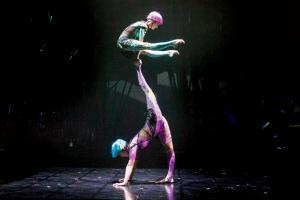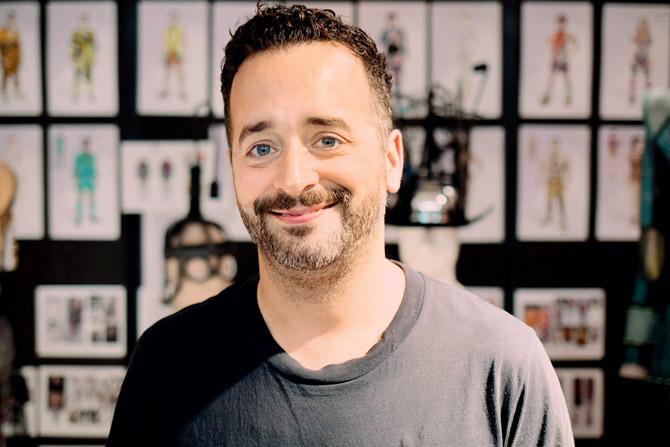In the run-up to Cirque du Soleil's debut show in India, costume designer James Lavoie discusses the inspiration for the outfits to be worn by steely acrobats

Cirque du Soleil's Bazzar will be a two-hour spectacle, offering an amalgamation of grandiose, acrobatic stunts
Between showcasing his work at the Lakmé Fashion Week and meeting a group of students in the city, famed Canadian costume designer James Lavoie has another important to-do list on his itinerary - visiting Mumbai's bazaars. The word caught his fascination ever since he was roped in to design the costumes for Cirque du Soleil's first production in India, Bazzar.
ADVERTISEMENT
For the audience here, it will be a first-of-its-kind exposure to the world's biggest entertainment theatrical, which will be running 64 shows of its latest act, across Mumbai and Delhi between this November and January. Those who've witnessed the marvels of Cirque du Soleil first-hand, would be familiar with this acrobatic game of order and disorder, that puts together an amalgamation of stunts ranging from teeterboard, portage, acrobatic bike, contortion, duo roller skate, duo trapeze, aerial rope, slackline and live music. But, what aroused Montreal-based Lavoie's curiosity was how the market scene here, could be used to ooze life into Cirque's magical universe. "The kind of energy [in the bazaars] and how it might feel to be in that environment is definitely what I want the audience to experience when looking at the 30-odd performing artistes," says Lavoie, in a telephonic interview.

James Lavoie
Lavoie, most recognised for his work as a production designer in theatre - he won the META award for Segal Center's Sherlock - is no stranger to the world of Cirque du Soleil. His first stint with the company was in 2012, when he designed the costumes for Chemins Invisible: La Frontiere De Pixels. With Bazzar, like the other Cirque productions that he has worked on, the brief, he says was "super open-ended". "For a designer that was exciting, because sometimes when you enter a project, the brief can be so specific that it can be very limiting," Lavoie says. "When you go into a rehearsal room of a Cirque show, you get to witness crazy personalities from all around the world. We wanted to make a show, where the costumes really reflected the eclectic energy of these artistes. And so, my brief was to create a family of characters, where each one stands out as a super individual, but it's also cohesive."
For Bazzar, Lavoie has designed about 32 costumes, and all of them, he claims, are unique. "Often, in a Cirque show, you have a lot of people wearing the same kind of costume, but in this one, while some artistes are set together as twins, each performer is expected to look different. It was a major challenge for me as a designer," he says.
Working on the costumes took him around nine to 10 months. "That includes the research, the ideation, the dreamy part of the process, the technical evaluation of the work, followed by creating the costumes, and integrating it all together, on stage," says Lavoie.
"The influence for the costumes for Bazzar came from all around the world. We researched on a lot of contemporary street fashion, history of street fashion, clothing and costumes. The first document I prepared after they gave me the brief, was a 150-page book of just the weirdest collage of things, juxtaposed into this one inspiration book," he says.
One might presume that the task of designing for acrobats would merely involve strapping them in stretchable suits, but with Cirque du Soleil, synonymous with grandness, and where each costume is meticulously planned till the last thread, such luxury is hard to come by. "The artistes are like superheroes. They do things, that to me, seem beyond human. Of course, the easiest thing to do is to put them in some tights and they would be able to do their number easily, but that's not Cirque."
At the LFW, Lavoie showcased three of his costumes from Bazzar, alongside the first sketches he prepared for them. Designing the outfit for the main character, the Maestro, was what he said, was most arduous. "The hat he wears, has these mechanical parts, and light built into it. The artisans also worked very hard on the hand-made shoes, creating the fabric for his suit, and the wig," says Lavoie, adding, "It's one thing to make a beautiful object that hangs on a hangar, and it's another thing to make a beautiful object that an artiste can use, to do these 'beyond human' performances in."
Catch up on all the latest Mumbai news, crime news, current affairs, and also a complete guide on Mumbai from food to things to do and events across the city here. Also download the new mid-day Android and iOS apps to get latest updates
 Subscribe today by clicking the link and stay updated with the latest news!" Click here!
Subscribe today by clicking the link and stay updated with the latest news!" Click here!






